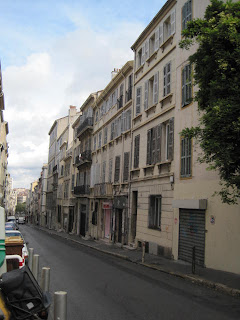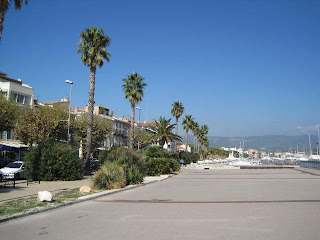Le Mistral is a sharp, cold wind that comes from the north, usually in the winter, and blows through the Rhone and Durance river valleys. In Provence, the Mistral usually comes after a cold rain and clears out all of the clouds. This is partly where Provence get the reputation of being sunny even in the dead of winter. I've noticed in my month of being here that the weather typically chooses an either/or scenario: rain or sun; unlike in Vienna, there are no cloudy, rainless days; only sunny, cloudless days. I think it makes a difference in the locals' temperament.
The Mistral also has the reputation of bringing good health, because the winds are dry, which helps circulation, and they clear away pollution and other nasty things that might develop in urban areas. The winds also work similarly to the Föhn, but in the opposite direction: it can dump lots of snow from the Alps onto lower altitudes; or, the Sirocco, which comes up from Africa over the Mediterranean, rather than down from the Bay of Biscay.
All this talk about le Mistral has made me think about other types of sea breezes; or, brises marines as they are known in France. In fact, a rather funny story springs to mind. I've been having a good time interviewing my new students. Some of them have great English skills, some have mediocre ones, and some...don't get me started.
Point is this: I have a number of students who are Corsican, and one of them was telling me how much she loves crime dramas because she is Corsican, and things like The Godfather are like a slice of life in Corsica...okay...I will leave the stereotyping of italophone peoples to those better versed in Mediterranean cultures. The problem of organized crime, my student was telling me, was really widespread in Corsica about 20 years ago. The crime family brise marine controlled basically everything, but they've more or less been shut down. She didn't know how to say their name in English, so I offered: "Sea Breeze?"
"Yes," she said. "There is no more Sea Breeze in Corsica."
At face value, this is hard to believe. But in this case, it's most likely a good thing.




































